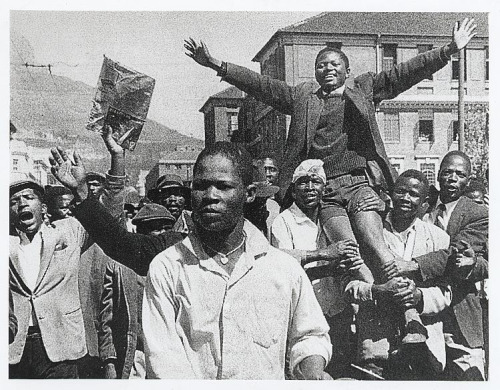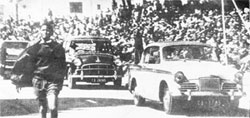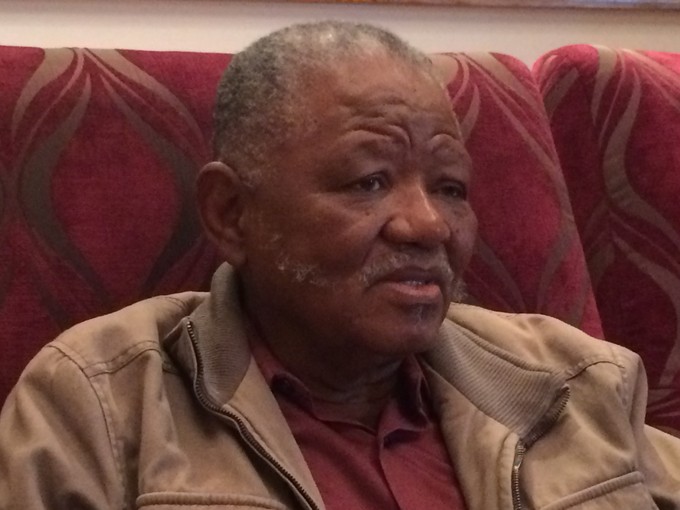Don’t blame apartheid for our problems, struggle hero tells government
Philip Kgosana remembers the 1960 march on parliament
On 30 March 1960, Philip Kgosana led a march of 30,000 people on Parliament in protest against the pass laws. He was arrested and jailed and later went into exile. Today, Kgosana, now nearly 80, will walk in the footsteps of his younger self to commemorate the protests and to remind Cape Town about a struggle which, he says, has not yet been won.
Kgosana was just 23 when he marched along De Waal Drive and down Roeland Street at the head of thousands of protesters. In photographs taken at the time, he is wearing a jacket which he says was provided by the principal of his former school, a sweater and a shirt provided by Pan Africanist Congress leader Nana Mahomo, and shorts he’d bought himself. The photographs do not show the slits he’d made with a knife across the top of his borrowed size five shoes so that he could cram his feet into them. His hair was long. Faced with a choice between food and a haircut, he’d chosen food.
“I went for a whole year with no haircut,” he says.
Kgosana was broke. Prevented by apartheid laws from studying pharmacy as he’d hoped, he’d been accepted into the University of Cape Town as a commerce student, but with very little money. The university’s residences were closed to him and he was living in migrant labour quarters in Langa, where he had become active in the PAC.
In the aftermath of the brutal police response to pass law protests in Sharpeville and Langa earlier in May, Cape Town was in the throes of a general strike. Several PAC leaders had been arrested over the previous ten days and Kgosana found himself precipitated into leadership. When the two small children he used as scouts came to tell him on 30 May that the police were beating strikers, and that several people had been badly injured, he went to join the crowds preparing to march on the city.
The objective was Parliament and a meeting with the minister of Justice, F C Erasmus.
But Parliament had been shut down and was surrounded by armoured vehicles. A state of emergency had been declared, as Kgosana and his fellow-marchers learned from the midday newspaper. Three thousand commandos were to be flown to Cape Town and the townships sealed off.
Police chiefs met Kgosana and other leaders on the corner of Roeland and Buitenkant Streets while most of the other marchers waited, and persuaded them to come to the police station. There, Kgosana was told that the minister would see him and a “small delegation” later in the day, provided the marchers dispersed.
He borrowed the police megaphone and addressed the crowd, telling them to go home. The protesters dispersed. “They had confidence we wouldn’t let them down”.
But when Kgosana returned to the police station later in the afternoon as planned, he was told: “The minister has no time to see you; you are under arrest.”
Months later, Kgosana says, he was to learn that Erasmus had told Parliament that he had never intended to meet “daardie klein kaffertjie”.


He was held in Roeland Street jail, in solitary confinement for 21 days, “in a cell the size of a toilet, 23 out of 24 hours”. He and 30 others were charged with incitement to public violence, breaking the pass laws, and marching to Cape Town without the permission of the town clerk. After nine months in jail he was granted bail - he still doesn’t know who paid it, because he had no money - and skipped the country. In his absence, the trial fell apart, he says, and charges were dropped.
The mood at the time was turning to armed struggle, and the PAC leaders had decided that young men should leave the country for military training where possible. Kgosana went to Ethiopia via Tanzania for parachute training. He finished his BA at the University of Addis Ababa, then his MA at Makerere University in Uganda.
Altogether, he was to be in exile for 36 years, 22 of them spent working for the United Nations, in Africa and Asia.
When he retired at 60, he returned home to the Winterveld, north of Pretoria - only to find that “in 36 years, nothing had changed”.
“The problems of our people were still the same.”
He threw himself into the struggle for transport, electricity and housing in the Winterveld, and into farming. Today he considers himself a farmer and “a man of God” - he is a candidate deacon in the Methodist church - and is not involved in party politics. On land inherited from his parents he grows mushrooms and moringa and has more than 1,000 citrus trees.
Today he will walk part of the route he and thousands of others took in 1960. His objective is to commemorate the protests and to remind the people of Cape Town of the decisive part they played all those years ago.
For Kgosana, the protest against the pass laws was the “entry” point to a bigger struggle, a struggle “to change the lives of African people” and replace the apartheid government with “an African government”.
Is he satisfied that this has happened? Not really.
“Political power is not an end in itself. It is a means to an end, a tool to achieve social and economic freedom. Our people want food, and schools, and houses. What are all these squatter camps? There is not one city in South Africa which doesn’t have this other city, this shack city, full of water and dead dogs. And these are growing.
“If there are children sleeping on the floor and studying under a tree, and you have power, you aren’t using that power.”
He is critical of those in authority who “blame apartheid” for South Africa’s problems after 22 years. “Why blame apartheid? You have been in charge.”
“There is a misuse of power for the accumulation of wealth.”
“If you get to power and you use it to make yourself rich, you are not doing your job. You are fooling us.”
Support independent journalism
Donate using Payfast

Don't miss out on the latest news
We respect your privacy, and promise we won't spam you.
Next: Happy ending for banned Zimbabwean
Previous: How a slave from Mauritius led a rebellion in Cape Town
© 2016 GroundUp. 
This article is licensed under a Creative Commons Attribution-NoDerivatives 4.0 International License.
You may republish this article, so long as you credit the authors and GroundUp, and do not change the text. Please include a link back to the original article.

